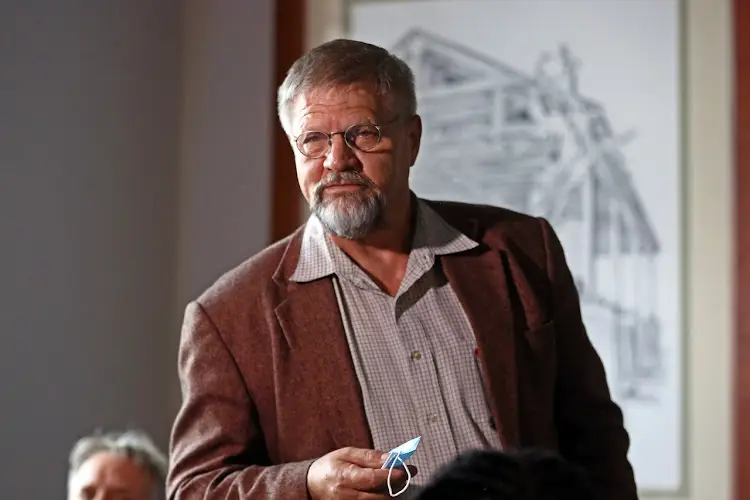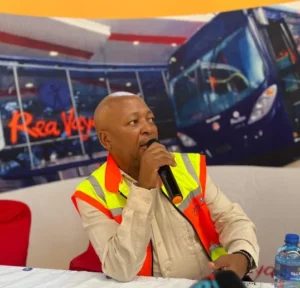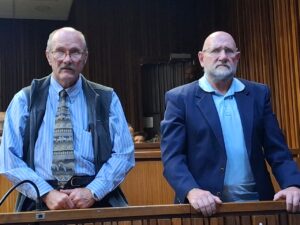By: Adriaan Fondse
In the given article, a multifaceted breach of common law is outlined, encompassing various transgressions, including High Treason, Genocide, Menticide, racketeering, perjury, obstruction of due process of justice through actions such as the suppression of evidence, the fabrication of information, conspiracy to conceal and perpetrate a crime, deliberate dereliction of duty, and the failure to uphold fiduciary obligations, resulting in malfeasance. Additionally, this includes involvement in acts of fraud, bribery, and the utilisation of expropriation as a guise for theft.
Judge Adriaan Fondse, a respected UCc judge, has faced an extended period of significant adversity lasting for more than a decade in his mission to allocate and make accessible a €50 billion fund aimed at promoting economic development and launching crucial projects for the betterment of the South African population. This fund has been available as per the global financial system’s design, and its implementation has been overdue worldwide since approximately 1997.
As a shareholder of the South African Reserve Bank and a duly appointed forensic investigator under the Department of Public Service and Administration (DPSA), with special power of attorney granted by the majority of Traditional Leaders of Indigenous Tribes in Southern Africa, the individual is vested with the authority to disclose these pertinent facts and to undertake any lawful actions necessary to reinstate law and order on behalf of the majority of South Africa’s population.
The appointment by the Presidency of South Africa is verifiable through the special legislation enacted within the Department of Public Service and Administration (DPSA). This legislation was formulated on the grounds that a corrupt entity cannot be allowed to invest, thus emphasising the commitment to upholding integrity. Furthermore, in accordance with the Constitution of South Africa, recognised globally as the supreme law of the land, provisions are made for the protection of the public, including the establishment of an International Constitutional Tribunal for World Peace (ICTWP), reiterate, the supreme power of the land, as stipulated in Section 33, 34, 38, and 39 of the Constitution Act 108 of 1996.
The formation of the ICTWP was officially announced and petitioned in accordance with Sections 33, 34, 38, and 39 of the Constitution, directed to various governmental entities, including the Presidency, the Department of Cooperative Governance & Traditional Affairs, SARS, and the JSE, among others. This declaration deemed the government to be operating unlawfully and ordered the vacation of government offices. In the absence of any defence or opposition raised within the stipulated 10 business days, it was legally interpreted that all accused parties, including members of parliament, tacitly acknowledged their involvement in illicit activities.
The South African public deserves comprehensive insights into the operations of the South African Reserve Bank (SARB) in conjunction with various commercial banks. Recent revelations of collusion among these banks, as acknowledged and promoted by the Bank Association of South Africa (BASA), have raised significant concerns regarding their influence, often likened to a “shadow government.”
There are credible allegations, substantiated evidence, and open conformations of their improper involvement in both legal and business proceedings. This involvement appears to extend to the potential exploitation of state departments, a matter that has become increasingly evident, particularly with recent disclosures about the Crime Syndicate formally exposed by Judge Fondse in March 2010 to SARB and all government departments.
It is pertinent to highlight that many executives who hold key positions within BASA also serve as CEOs of major South African banks and represent share blocks in SARB. This interconnectedness raises questions about the effectiveness of banking supervision for the collective interest of the public.
Moreover, there have been claims advocating for legislation that could potentially lead to the expropriation of public assets and wealth under the guise of fabricated pandemics, such as the COVID-19 crisis. There are concerns about the application of harmful technologies, allegedly supported by falsified science, and financed through taxpayer funds, with the suspected objective of harming the well-being of taxpayers. This situation has been likened to a chicken and egg scenario, where a fabricated famine exacerbates the effects of an already weakened economy.
The banks implicated in alleged money laundering activities include FNB, RMB, First Rand Bank, Nedbank, ABSA, Investec, and Standard Bank, all of which are listed as members of BASA. These allegations and interconnected interests underscore the need for thorough investigations and transparency to safeguard the public interest and maintain the integrity of South Africa’s financial institutions.
The entities implicated in the alleged criminal activities encompass a wide range of institutions and individuals, including SAPS (South African Police Service), Police Intelligence, the Financial Intelligence Centre, the Hawks, the Special Investigation Unit (SIU), the NPA (National Prosecuting Authority), the South African Secret Service Agency (SSA), International Organised Crime Agencies, Mossad, Crown Company Agents, as well as prominent figures such as Mr. Cyril Ramaphosa and Johan Rupert. Furthermore, the South African government, allegedly influenced and controlled through its connections with banks and BASA (Bank Association of South Africa), is also implicated.
Notably, this list includes personnel from SARB (South African Reserve Bank), including the Governor, Deputy Governors, and executives, both past and present, along with executives from South African banks. They are involved as accomplices in the alleged crimes.
Numerous cases have been reported, each with apparent evidence of theft concerning Africa’s business and development opportunities. These cases encompass strategic control of minerals and infrastructure, property development projects, the operation of cartels leading to the liquidation of agricultural industries, targeted farm murders, and illegal takeovers of farms, which also involve the Landbank. These cases were treated as civil matters by the Judiciary, effectively sidelining the inspection powers of the state. This has led to allegations that the complainants have been targeted, and their cases systematically ignored. Such actions were allegedly conducted with the active collaboration of individuals within the legislative, enforcement, and executive branches, including Parliament.
In September 2022, the funds previously mentioned were indeed received within the country. In accordance with international banking regulations and the South African Reserve Bank Act, it is a legal obligation for a client to be promptly notified by their bank, acting as an agent for SARB, when offshore funds are received. However, an unfortunate lapse in this obligation occurred at FNB, Brooklyn Mall. They failed to inform Judge Fondse about the funds received on behalf of the public, intended to support and restore economic activities.
This oversight demonstrated a lack of respect for the public interest, further exacerbated by the conduct of a legal team who, upon scrutiny, appeared to base their objections on fabricated and deceitful claims. This raises suspicions of an intention to unlawfully utilise the funds for financing the “deep state’s” illicit activities, including unauthorised trading with another party’s assets.
It is noteworthy that numerous similar incidents of unlawful practice, protected by the Judiciary, exist, wherein funds earmarked for economic activities on behalf of the people of South Africa are allegedly misappropriated.
Requests for pre-approvals for the entire fund were submitted to SARB as early as 2018, with acknowledgment of receipt by the Governor of SARB. Despite repeated efforts to arrange personal meetings with the Governor, Judge Fondse was consistently redirected and denied direct communication regarding the funds, with interactions channeled through third parties. This resulted in an unlawful situation where the public was effectively denied access to these funds, which were intended to support economic activities and improve living standards.
To establish legal ownership, the funds were withdrawn from the banking system in March 2023 and subsequently redeposited in July 2023. This action was taken following indications of a potential theft attempt, allegedly supported by senior officials within FNB, RMB, and FirstRand Bank, as evidenced by reports communicated via email to relevant officials.
Due to concerns regarding racketeering activities within the banking system, strict restrictions were placed on the funds transferred to South Africa. These restrictions included an irrevocable pay order, eliminating the possibility of allowing reverse back requests without interest payable to the source or capital return to the source. These conditions were designed to allow for a comprehensive investigation, shedding light on the extensive intricacies of certain executives’ operations within the banking system and highlighting the perceived capture of SAPS.
The investigative process, in collaboration with Traditional Leaders, associated with Monarchies and Kingdoms, embarked on a challenging journey. This endeavour involved a series of meetings with prominent officials from various organisations, including the SAPS National Office, Military veterans, officials from the South African Secret Service Agency (SSA), the Minister of State Security, senior officials from the Department of Public Service and Administration (DPSA), among others. Representatives from the Hawks and the head office of FNB in Sandton were also engaged in discussions.
Regrettably, attempts to arrange meetings with the Governor of SARB, in whom the Judge holds a shareholder position, were met with illegitimate obstacles, preventing such interactions from taking place.
There has been a prevailing inclination among senior officials to categorise these alleged criminal offences as civil matters, rather than criminal ones. This approach has raised concerns as it potentially hampers the progress of legal proceedings, a situation often referred to in law as “Justice delayed is justice denied.”
Of particular note, certain individuals of personal interest, including Alexander Ellis, Chris van der Walt, Johan de Jagers, Andre Malherbe, Jacques Cilliers, and the conflicting shareholders in SARB such as the Rupert Family (trust) interests and the Oppenheimer Family interests, have positioned themselves, by design, to circumvent legal scrutiny regarding anomalies in bank supervision. They have employed various strategies, including creating diversions and employing delaying tactics, such as strong-arm financial manipulation, which obstruct the immediate release of the funds held unlawfully. The conduct of this cartel and their respective positions is a matter of deep concern.
Moreover, it is distressing for the public to learn of potential involvement in activities such as the stripping of infrastructure to the detriment of taxpayers, including the dismantling of rail systems and Eskom substations, as well as illegal interests in public entities like SAA and Eskom. Suspicions of human trafficking being used as an extortion tool within this organisation, bribery through various forms of gratification, and manipulation of legal commissions, courts, and court proceedings, are all matters that raise significant red flags and pose a critical concern for the safety and well-being of all South African citizens.
During a visit to FNB in Sandton, the executives chose to remain secluded in their offices and steadfastly declined to release the funds designated for the public’s benefit. As Judge Fondse’s efforts to secure the imminent release of the funds gained momentum through various initiatives that had access to the release codes, a concerning turn of events occurred. FNB’s CEO, Mr. Jacques Cilliers, took the extraordinary step of blocking Judge Fondse’s email address. Subsequently, an unauthorised action was taken to close his personal account from an undisclosed source. This raises questions about whether these actions are attempts to bolster the misappropriation of the substantial Euro 50 billion funds.
The Police Service Act 68 of 1995, The Prevention of Corrupt Activities Act 12 of 2004, common law provisions, and the Constitution of South Africa collectively mandate that an Officer or a public official is not required to seek permission before taking action when they witness or receive reports of a crime in progress. It imposes a duty on the officer to act independently, in accordance with their responsibilities and the authority vested in them, for the following purposes:
1. Prevention of crime.
2. Investigation of any offence or alleged offence.
3. Maintenance of law and order.
4. Preservation of the internal security of the Republic.
This aligns with their training and job requirements. If an officer fails to act within the parameters of the law, they effectively assist and support the perpetrator, which harms and prejudices the victim(s), the public, and law enforcement in general. This situation contributes to the prevailing distrust of the government, which is perceived by some as a corporation masquerading as an elected government, particularly considering recent concerns related to voter fraud, as exemplified by the CR17 scandal.
The above observations also suggest a premeditated agenda by the entity known as SOUTH AFRICA INC., registered under CIK#: 0000932419, which appears to be masquerading deceptively as authorised by the South African public. This involves the deliberate use of unlawful actions, equivalent to serious offences like High Treason, Genocide, Menticide, Obstruction of Justice, Fraud, Perjury, Theft, Robbery, and more.
The public is respectfully urged to step forward and share any information or documentation pertaining to incidents involving SAPS, HAWKS, SARB, or other banking institutions in South Africa that may be similar in nature. A sincere request is extended for full cooperation and support in this matter, as your contribution is crucial in addressing these concerns effectively.








This demons can be destroyed as soon as our people are healthy and eat plantbase food then they will pray them dead .
Wow 👌
This government where the state assumed trusteeship responsibility on behalf of the aboriginal has created a criminal offences by illegally creating the trust and also by appointing themselves as trustee which is also a criminal offence. The beneficiaries received nothing since 1909 when this illegal trust was created. We the aboriginal cease to exist this trust and relinquish their duties fired them as trustee the beneficiaries.
This means the laws of this government cease to exist and we now claimed our responsibility as trustee on behalf of the beneficiaries. The kingdom of southern Africa Dynasty of King Moshesh 1